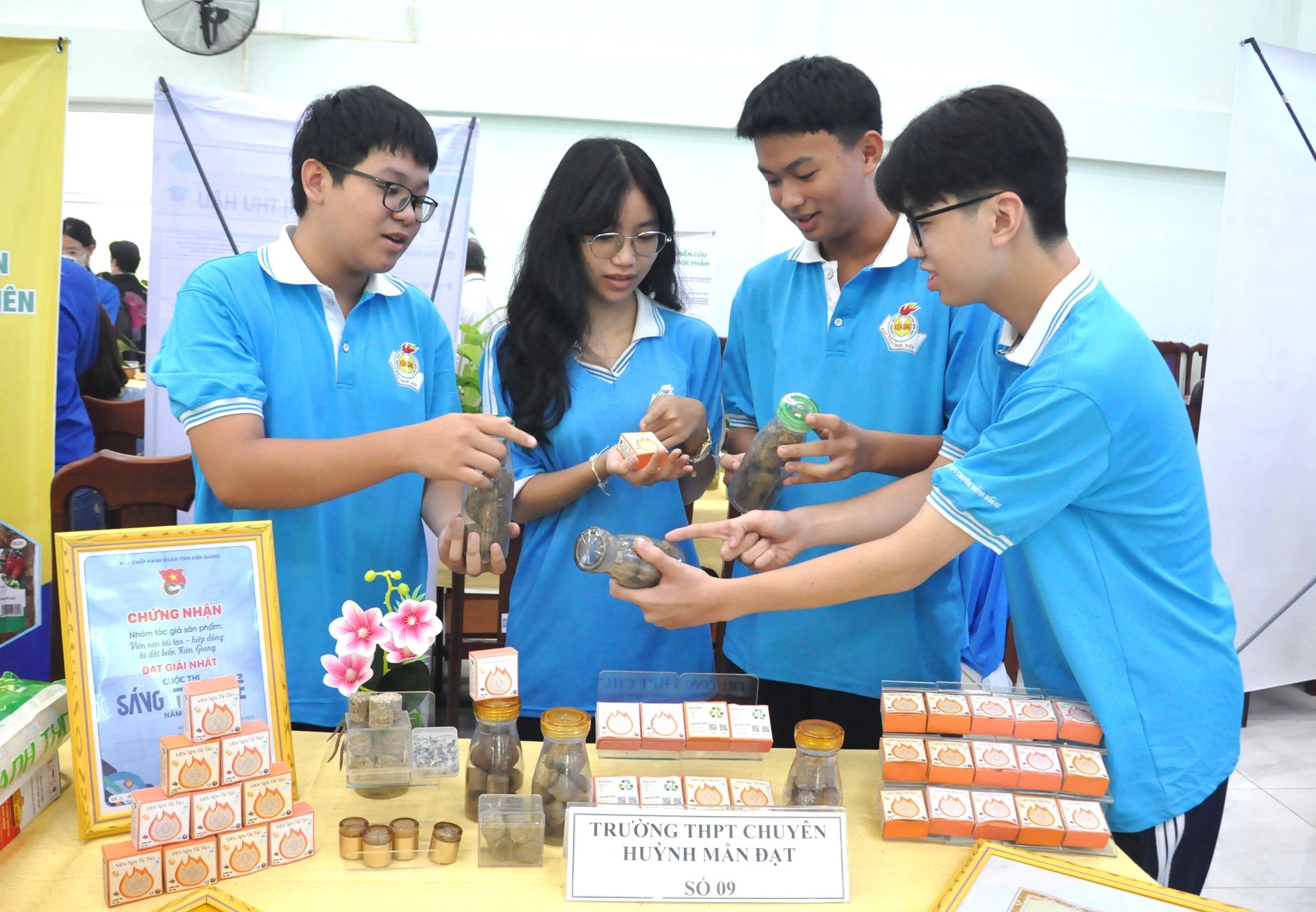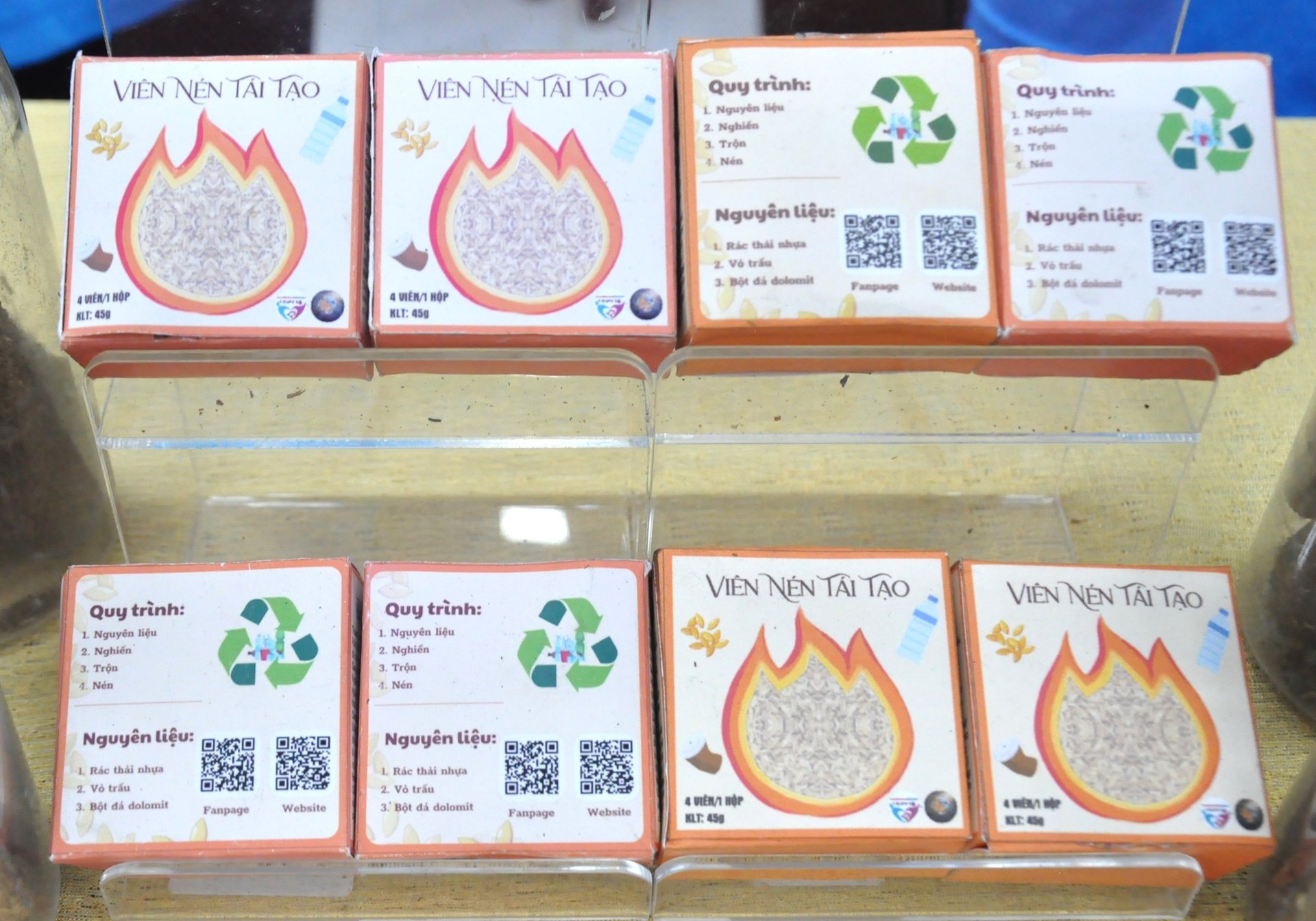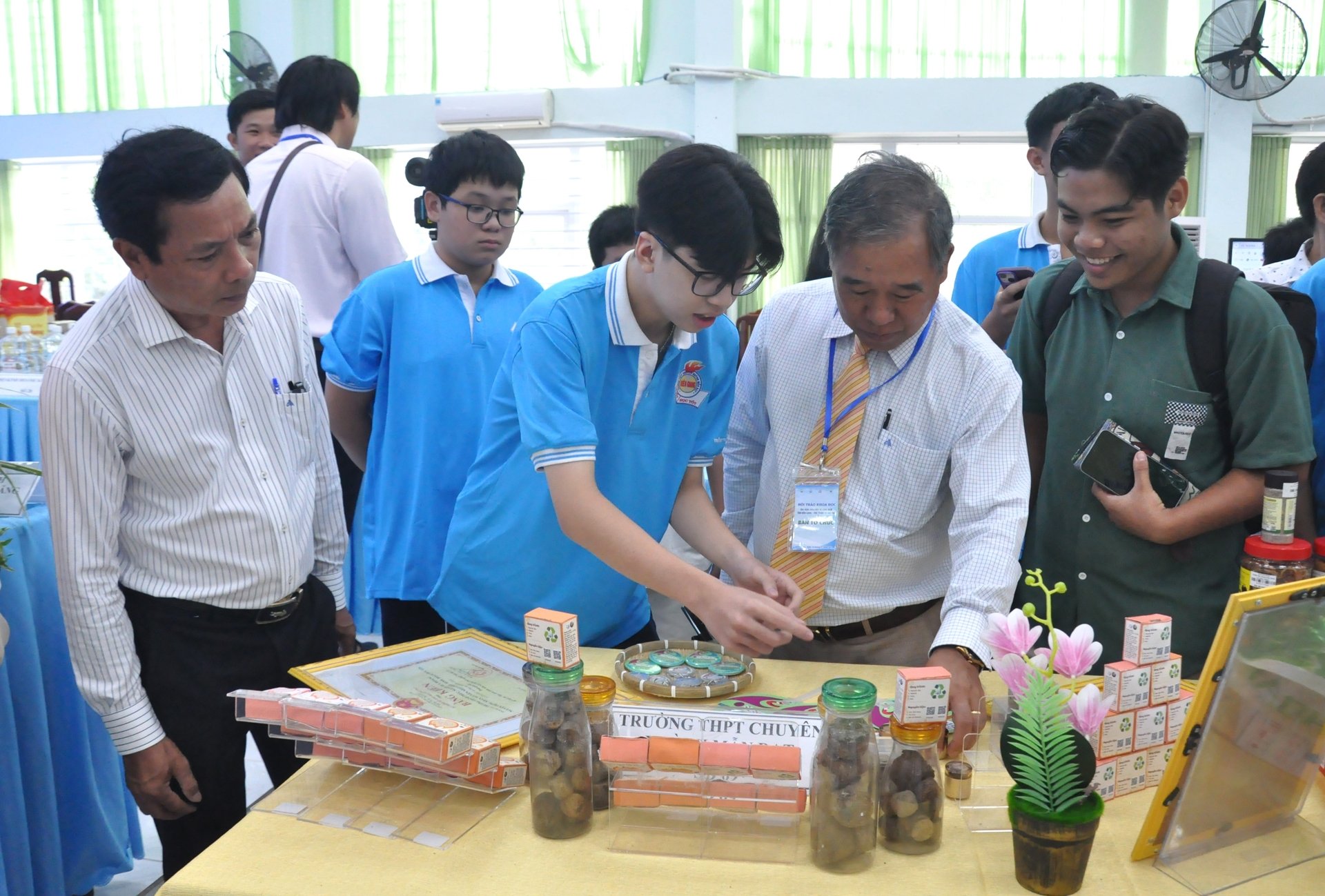December 4, 2025 | 01:22 GMT +7
December 4, 2025 | 01:22 GMT +7
Hotline: 0913.378.918
December 4, 2025 | 01:22 GMT +7
Hotline: 0913.378.918
I attended the closing ceremony of Huynh Man Dat High School for the Gifted in Rach Gia Ward, An Giang Province, at the end of May. Groups of students were chatting and tearfully bidding farewell to their school years. I found Truong Thanh Phuc, a senior student and the team leader of the "Recycled Pellet - Synergy from the Land and Sea of Kien Giang" project, which achieved the first prize at the provincial science and engineering competition, in the midst of this emotional atmosphere.
Phuc and his Grade 11 classmate, Hoang Duc Tin, are both engaged in environmental science initiatives that convert waste into resources. I asked about the project's name and requested an explanation from Phuc. "Our recycled pellets are produced by melting plastic waste, mixing it with rice husks and dolomite powder, and compressing the mixture into pellets," he stated. “The phrase ‘synergy from the land and sea of Kien Giang’ refers to how our materials come from plentiful household and agricultural waste in the area.”

Students from Huynh Man Dat High School for the Gifted display and introduce the application of renewable pellets at the Innovation and Entrepreneurship Competition organized by Kien Giang University. Photo: Trung Chanh.
The students' supervising teacher, Ms. Lam Thi Van Ha, M.Sc., who accompanied them throughout their investigation, provided additional insight: "An Giang has the largest rice cultivation area in Vietnam, producing over 8 million tons of rice annually.This leads to an immense quantity of rice husks formed during the milling and refining processes. Additionally, the province is home to numerous limestone mountains, which serve as the source of dolomite powder".
The recycled pellet is nick-named a "green coal nugget" because it is compressed from waste and can generate high heat when consumed, making it a suitable substitute for coal in industrial applications.

Renewable pellets are likened to “green charcoal” compressed from waste. When burned, they generate high heat and can replace coal in industrial production. Photo: Trung Chanh.
"An Giang is also a province that is riverine and coastal." Agricultural production and daily life result in the discharge of a substantial quantity of plastic refuse into the environment. Our objective is to recycle plastic waste at the source, thereby preventing additional environmental harm, rather than collecting it from rivers or the sea. That is the significance of the synergy from the land and sea of Kien Giang, Ms. Ha supplemented.
Throughout the duration of the undertaking, the students encountered numerous challenges. Due to their lack of access to an appropriate facility, they utilized the storage room at the school. With no industrial equipment, they improvised using household items. To find the optimal formula and conduct proper experiments, the team reached out to scientists at the Vietnam Academy of Science and Technology. They were able to effectively conclude their research as a result of the modern and easily accessible laboratory facilities.

Dr. Nguyen Xuan Niem (second from right), Chairman of the An Giang Province Innovation and Startup Association, visited and evaluated the renewable pellet product introduced at the conference on achievements in scientific and technological research. Photo: Trung Chanh.
After months of testing, the team arrived at the optimal formula: 62.5% recycled plastic + 20.8% rice husks + 10.7% dolomite powder. The resulting pellet is dense, burns longer, produces more heat than coal, leaves minimal ash, and significantly reduces emissions of chlorine and potassium elements that commonly corrode industrial boilers.
In addition to school competitions, Phuc and Tin aspire to implement their research in the real world by pioneering a social entrepreneurship model. Their pellets have the potential to increase the income of local residents by utilizing plastic and rice husk waste, reduce their dependence on coal, and increase environmental awareness.
"We observed that the fuel pellet combusts strongly when burned in high-temperature furnaces, producing a higher heat output than coal and avoiding the slag buildup that is frequently observed with rice husk firewood. That renders it exceedingly appropriate for industrial applications,” Phuc disclosed. Several local businesses have currently reached out to the team to investigate the feasibility of utilizing the particles as a substitute for coal in seafood processing operations.
Translated by Linh Linh
/2025/12/01/2936-2-222331_70.jpg)
(VAN) Mortgaging his house and giving up a pharmaceutical management career, Mr. Nguyen Quang Duy succeeded in bringing Khanh Hoa's sea grapes to demanding markets such as Japan and the U.S.

(VAN) The large-scale agroforestry investment project aims to develop a leading sustainable agro-industrial center in Angola.
/2025/11/28/3433-1-212821_213.jpg)
(VAN) Many localities across the coconut land of Vinh Long are replicating emission-reducing models in production and daily life, contributing to the targets for emission reduction and green economic development.

(VAN) The green transition is an inevitable path for collective economy to achieve balanced growth and align with global trends.

(VAN) The TH Group is not only Vietnam’s leading clean-milk producer; it is also leaving a strong mark on sustainable development as it pursues the goal of carbon neutrality.
/2025/11/27/3830-1-152901_403.jpg)
(VAN) Dong Nai is developing its key crop areas, expanding planting area codes, and applying high technology to increase the value of agricultural products, aiming at a green and sustainable agriculture.

(VAN) Tay Ninh’s livestock sector is undergoing a major transformation, applying high-tech, closed-loop circular models to build sustainable value chains.